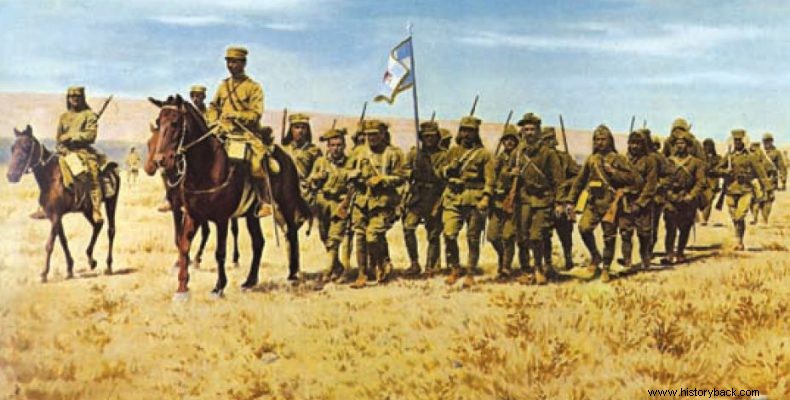
The Greek Army landed in Smyrna, in 1919, as the representative of the great powers, which, after the enormous human sacrifices of the flower of their human potential in the trenches of the First World War, did not wish for any reason, how much rather to serve the Greek interests, to repeat them fighting against the Kemalist forces, in the depths of Anatolia.
The region of Smyrna, and only this one, would be awarded to Greece, after five years from the signing of the treaty of Sevres, but after a referendum of its inhabitants. Then El. Venizelos announced elections, even posing a political issue, thus providing himself with the opposition incapable of standing up to his successes.
The united opposition, with the slogan of the return of Constantine, won the elections. However, the importance of this state and political change in Greece should not be overestimated, in terms of the attitude towards it of the great powers of the time.
Italy did not wait for the defeat of Venizelos to express its displeasure with the Greek presence in Asia Minor. France, as soon as Kemal effectively restored the old regime of the "Diomologie", and after putting up a formal resistance, for the price of arms, in Cilicia, joined the Kemalites and her few troops left Asia Minor, but leaving the Turks their heavy armament.
The British also, who held northwest Asia Minor with rudimentary forces, withdrew, placing this responsibility on Greece, which deployed the 3rd Army Corps there. But the Soviet Union was also the main supplier of heavy weapons to the Kemalist army, as a result of Greece's involvement in the Ukrainian campaign of 1919, again at the suggestion of Venizelos.
The pro-Kemal French attitude as well as the intense Franco-British rivalry in the Near East pushed our ally, in April 1921, to declare their strict neutrality towards the belligerents and the Greek effort to receive a strong and unexpected blow.
Britain, with the cooperation of France and Italy, stopped the supply of the necessary war material to Greece. After the elections of 1920, they stopped recognizing in Greece the rights of war, as well as the right to spy on their commercial ships that supplied Kemal with war material.
France also took the lead in denying the "allies" in Greece the right to use Constantinople as a naval base. And France is followed in anti-Greek rage by Italy, which supplied Kemal with all kinds of war material, even airplanes!
And the USA, after the presidential elections of November 4, 1920, returned to the policy of isolationism. Britain encouraged Greece, but did not support it enough, ready to benefit from a possible Greek victory, but also ready to abandon it in the event of a defeat. What interested the British was the defense from any Turkish actions of today's Iraq, whose "protection" they had undertaken. For its part, France did not want to leave the field of action free to the British in the Middle East.
And Italy took advantage of this anti-jealousy, with the aim of gaining a share in the Middle East, but also in the Balkans, imposing in principle the concession of Northern Epirus to Albania, which it placed under its "protection" - until today - and keeping the Greek Dodecanese, despite the Venizelos-Titoni agreement.
The British attempted to achieve a diplomatic solution to Asia Minor by organizing the London Conference. Before the conference ended, the French Prime Minister Aristides Brian signed an agreement with the Kemal delegation, which provided for the recognition of the revolutionary government of Mustafa Kemal by France.
This agreement provided for the cessation of hostilities between France and the government of Ankara and others regarding Cilicia, its evacuation by the French and above all the right of priority for France in Turkish mines as well as participation by France in the railway operations of Turkey and with a view to succeeding Germany in a large part of the Bagdad railway.
On March 16, 1921, the Ankara government signed the Moscow Treaty with the Soviet Union. With this, Turkey secured its northeastern borders, while the ESR consolidated its power in the Caucasus region. On the same day, an agreement was signed for the free financial assistance to Mustafa Kemal. Lenin offered 10 million gold rubles to Kemal, in two installments of 5 million each. The Turks also received 327 cannons, about 40,000 rifles, 150,000 shells, 63 cm cartridges, and hundreds of tons of fuel.
Strangers don't save
After the involvement of Greece in Asia Minor, the only solution left was to evacuate Ionia, or for the army to undertake operations to crush the Kemalist forces. The second solution was preferred, which was just as wrong as the first. The advance of the Greek Army into a hostile hinterland, without securing its lines of communication, with its sides literally in the air, was at least a risky, if not completely pointless and stupid act.
However, in the impasse that Greece had reached, trying to reap the "gifts" of its new Danaan "Allies", there was no other way out. However, even in the black disaster that finally followed, the "Allies" watched unconcernedly the massacre of Greek civilians by the Kemalian humanoids, killing any unlucky ones who tried to find shelter in their warships, which were anchored in the port of Smyrna.
That is where the division led, which the foreigners of course imposed, but using as a vehicle Greeks, who had forgotten the quote of the Elder of Moria, Theodoris Kolokotronis, which said:"a foreign sword will not liberate Greece".
